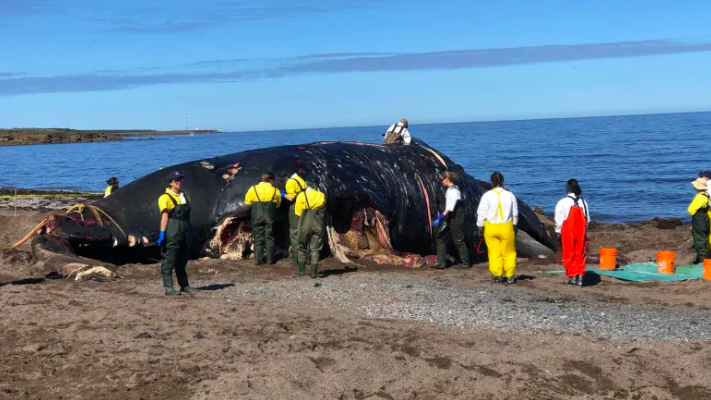
Punctuation, a right whale who was killed earlier this week. Photo: Gary Mansfield, CBC
Since we reported on the death of a young male North Atlantic Right Whale a few weeks ago, there have been five more dead whales found in Canadian waters, the latest one discovered just yesterday and a total of four in the last three days. In response, Transport Canada immediately implemented an interim, precautionary speed restriction of 10 knots, for vessels of 20 meters or more in length traveling in the western Gulf of St. Lawrence, where all the whale deaths have been reported.
Why This Matters: A recent study by the U.S. and Canadian governments underscored that these whale deaths are most likely caused by humans and thus are preventable. it is good that the Canadian government has stepped up its efforts and recognizes the grave circumstances. “Protecting our endangered North Atlantic right whales is an important task, one that our government takes seriously,” said Canadian Transport Minister Marc Garneau. But whatever we have been doing thus far this year, it is not enough. And the new babies that have been identified will not be improving the situation if we lose adults of childbearing age.
Whales Swim Around And Into Harm’s Way
- “One of the things that caught us off guard this year is that the right whales are in a really different location than in previous years,” said Kim Davies, an oceanographer and whale expert.
- Davies also noted that said the “whales are present over a really, really large area of the Gulf and individual right whales move around constantly” — the problem is they aggregating further north and further east in the Gulf of St. Lawrence, closer to shipping lanes.
These Whales Were Not Anonymous
- The first was a juvenile male known as Wolverine, who had been entangled in fishing gear and struck by ships.
- Punctuation was a breeding female who had mothered eight calves and then gone on to have several grandchildren.
- Comet was 33 years old male who was familiar to whale-watching experts who was believed to be a grandfather.
- Another was a female identified as #3815 who was on the cusp of sexual maturity and had yet to give birth, according to the New England Aquarium.
- The fifth was discovered along Anticosti Island in Quebec yesterday and the New England Aquarium identified as #3329, a 16-year-old female who had yet to calve.
- The sixth, which has yet to be identified, was found drifting off Quebec’s Gaspé Peninsula during an aerial surveillance flight.
June 27, 2019 » Canada, extinction, right whale, ship strikes


